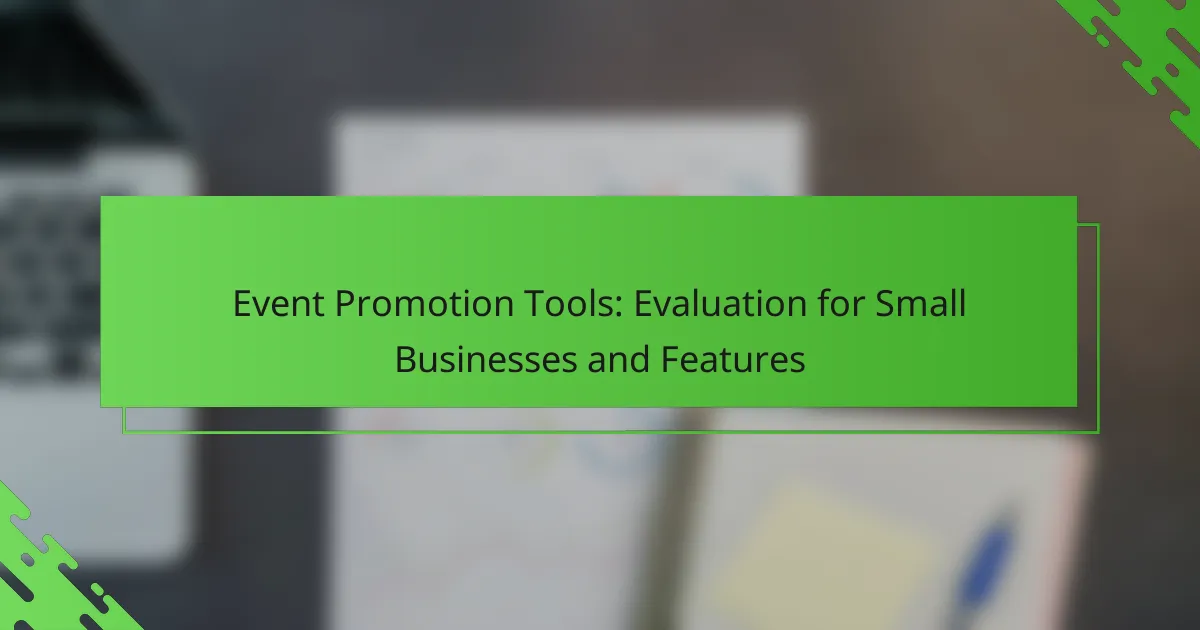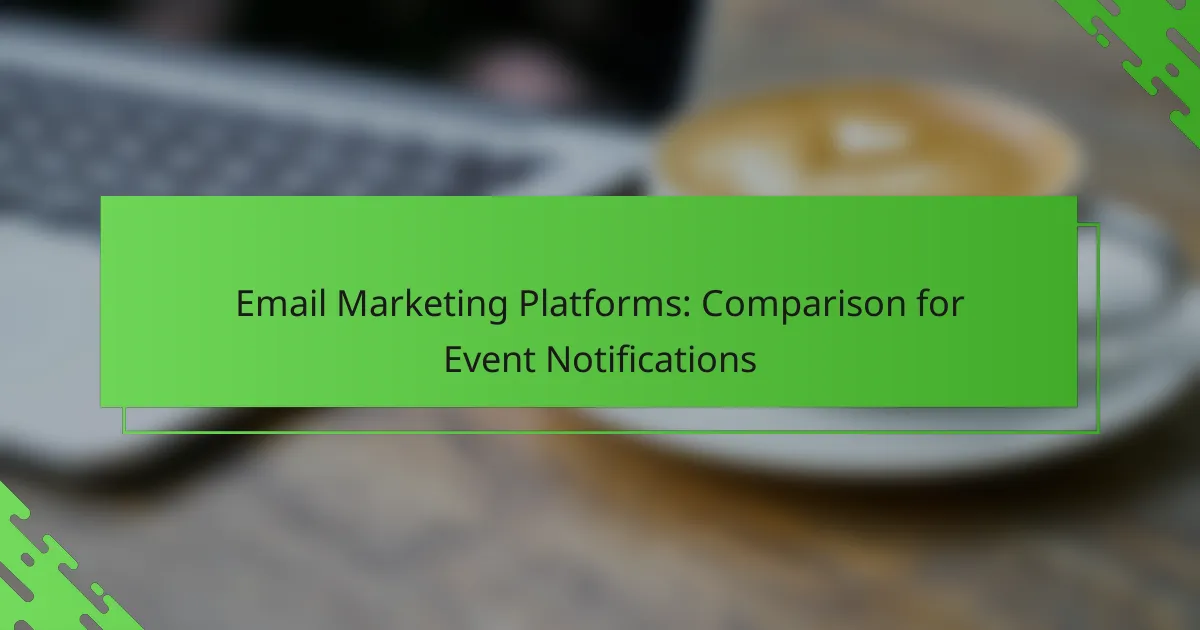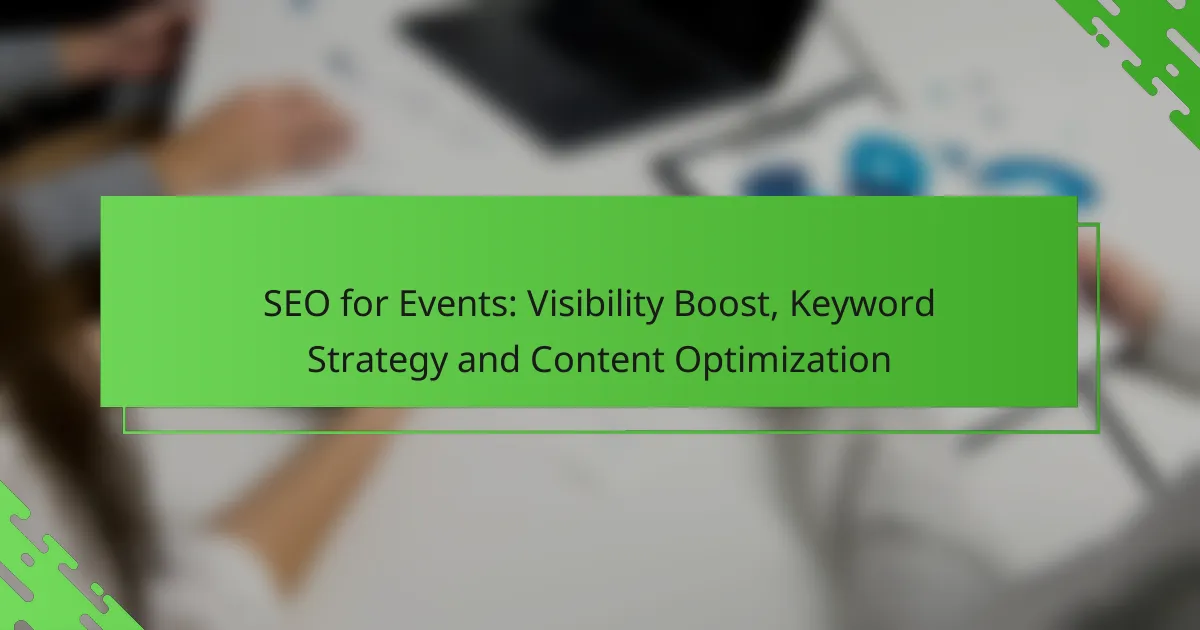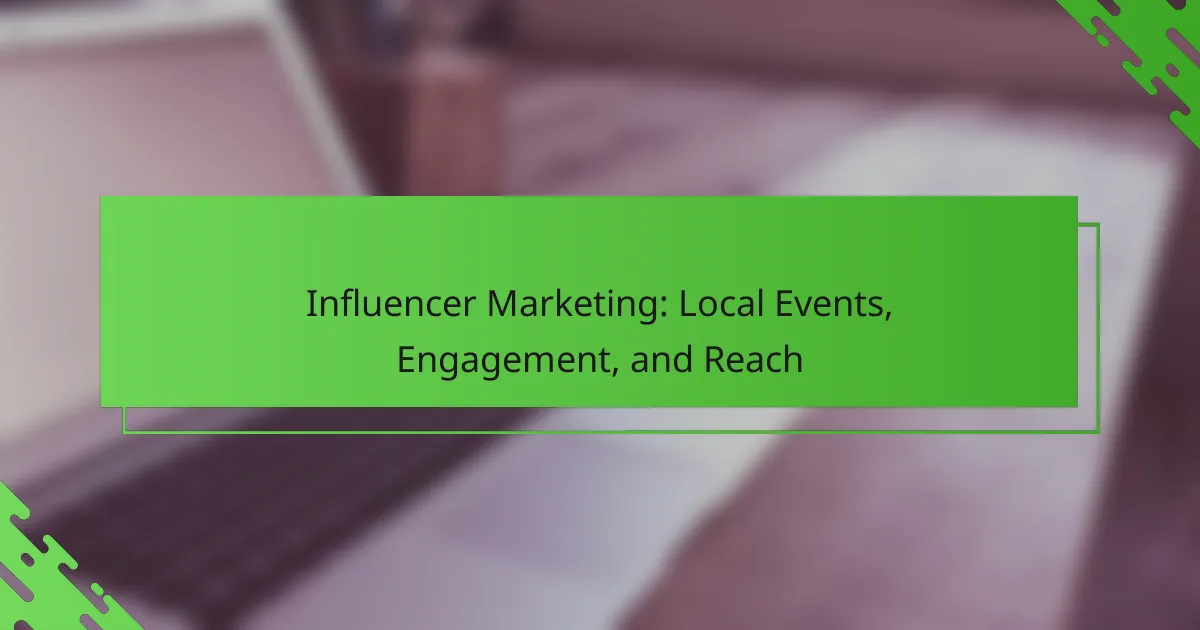For small businesses looking to enhance their event marketing efforts, selecting the right event promotion tools is essential. These platforms not only facilitate event creation and ticket sales but also optimize marketing strategies to effectively reach target audiences. By evaluating features such as social media integration, analytics, and email marketing capabilities, businesses can ensure they choose a tool that aligns with their needs and budget.
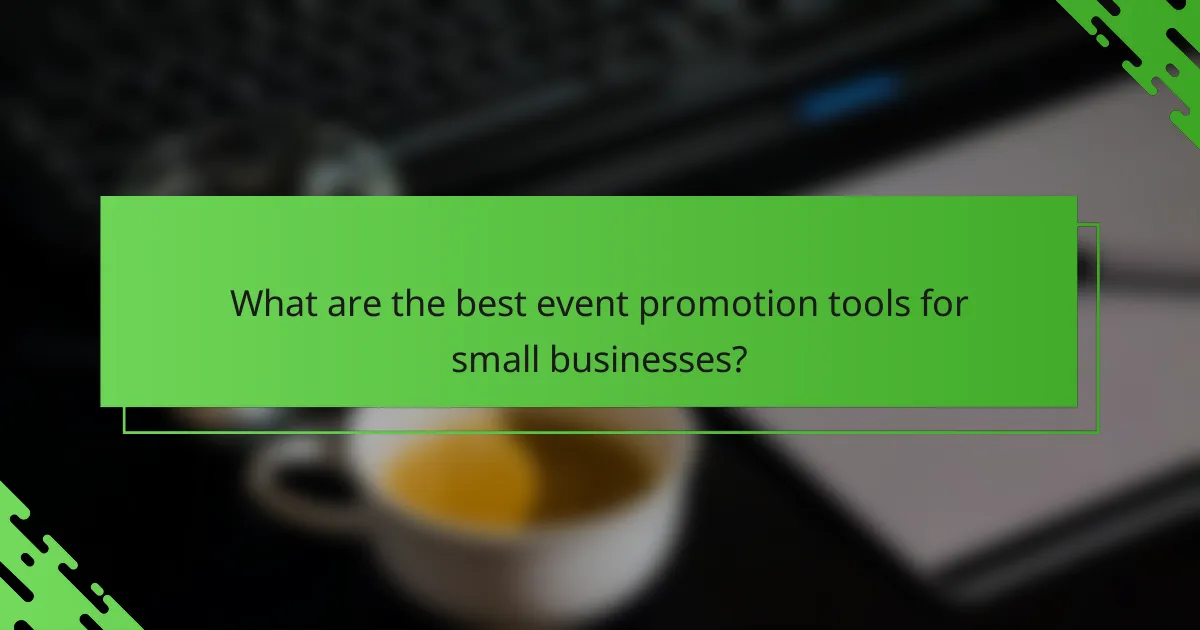
What are the best event promotion tools for small businesses?
The best event promotion tools for small businesses include platforms that streamline event creation, marketing, and ticket sales. These tools help businesses reach their target audience effectively while managing costs and maximizing attendance.
Eventbrite
Eventbrite is a widely used platform that allows small businesses to create, promote, and sell tickets for events. It offers customizable event pages, ticketing options, and promotional tools to reach potential attendees.
Consider using Eventbrite if you want a user-friendly interface and integrated payment processing. The platform charges a fee per ticket sold, which can vary based on the pricing tier you choose, so factor this into your budget.
Meetup
Meetup focuses on building communities around shared interests, making it ideal for small businesses looking to engage with local audiences. You can create groups and events that cater to specific demographics or interests.
When using Meetup, be aware of the subscription fee for organizing events, which can be a barrier for some. However, the platform’s emphasis on local connections can lead to higher engagement and attendance.
Facebook Events
Facebook Events leverages the social media giant’s vast user base, allowing small businesses to promote events to a targeted audience. You can create events, invite followers, and share updates easily.
Utilize Facebook Events to reach people who already engage with your brand. Keep in mind that organic reach can be limited, so consider boosting posts to increase visibility, especially for larger events.
Eventzilla
Eventzilla is a versatile event management tool that offers features like ticketing, registration, and promotion. It is particularly useful for webinars and virtual events, as it integrates well with various online platforms.
When choosing Eventzilla, evaluate its pricing structure, which includes a free tier for free events and paid options for ticketed events. This flexibility can help small businesses manage costs effectively.
Whova
Whova is an all-in-one event management platform that excels in attendee engagement and networking. It provides tools for event registration, agenda management, and attendee interaction through its mobile app.
Consider Whova if you want to enhance attendee experience through features like personalized agendas and networking opportunities. Its pricing is based on event size and features, so assess your needs carefully to choose the right plan.

How do I choose the right event promotion tool?
Choosing the right event promotion tool involves evaluating features, considering your budget, and assessing user experience. Each factor plays a crucial role in ensuring the tool meets your business needs and effectively reaches your target audience.
Evaluate features
Start by identifying the essential features you need, such as email marketing, social media integration, ticketing options, and analytics. Look for tools that offer a combination of these functionalities to streamline your event promotion efforts.
Consider tools that provide customizable templates for emails and landing pages, as well as options for audience segmentation. This allows you to tailor your messaging and improve engagement with potential attendees.
Consider budget
Your budget will significantly influence your choice of event promotion tools. Many platforms offer tiered pricing plans, so assess what features are included at each level to ensure you get the best value for your investment.
Look for tools that offer free trials or basic free versions to test their capabilities before committing financially. This can help you avoid overspending on features that may not be necessary for your specific events.
Assess user experience
User experience is critical when selecting an event promotion tool. A platform that is intuitive and easy to navigate will save you time and reduce the learning curve for your team. Look for user reviews and ratings to gauge overall satisfaction.
Additionally, consider the availability of customer support and resources, such as tutorials or forums. A responsive support system can help you troubleshoot issues quickly, ensuring your event promotion runs smoothly.
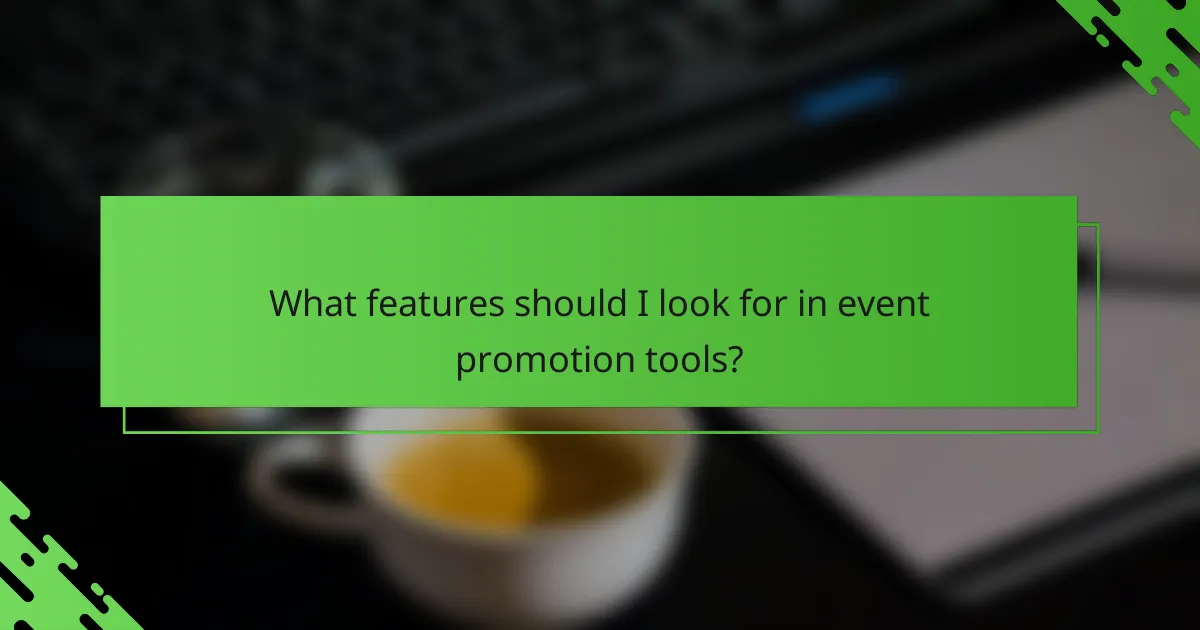
What features should I look for in event promotion tools?
When evaluating event promotion tools, focus on features that enhance visibility, engagement, and management of your events. Key aspects include social media integration, analytics capabilities, email marketing functions, and ticketing options, which collectively streamline the promotion process and improve attendance rates.
Social media integration
Social media integration allows you to promote events across various platforms seamlessly. Look for tools that enable easy sharing on popular networks like Facebook, Instagram, and Twitter, as well as options for creating event pages directly within these platforms.
Consider tools that offer automated posting features, which can save time and ensure consistent messaging. Additionally, check if the tool supports social media advertising, as this can significantly boost your event’s reach.
Analytics and reporting
Analytics and reporting features help you track the performance of your event promotions. Choose tools that provide insights into ticket sales, audience demographics, and engagement metrics, allowing you to assess what strategies work best.
Look for customizable reports that can highlight key performance indicators (KPIs) relevant to your goals. This data can inform future marketing efforts and help you refine your approach over time.
Email marketing capabilities
Email marketing capabilities are essential for reaching your audience directly. Select tools that offer customizable email templates, automated reminders, and segmentation options to tailor messages to different audience groups.
Ensure the tool can integrate with your existing email list and provide tracking features to measure open and click-through rates. This will help you optimize your email campaigns for better engagement.
Ticketing options
Ticketing options are crucial for managing event attendance. Look for tools that offer various ticket types, such as early bird, VIP, or group discounts, to cater to different audience segments.
Consider whether the tool provides secure payment processing and mobile ticketing features, which enhance the attendee experience. Additionally, check for options that allow for easy refunds or transfers, as flexibility can improve customer satisfaction.
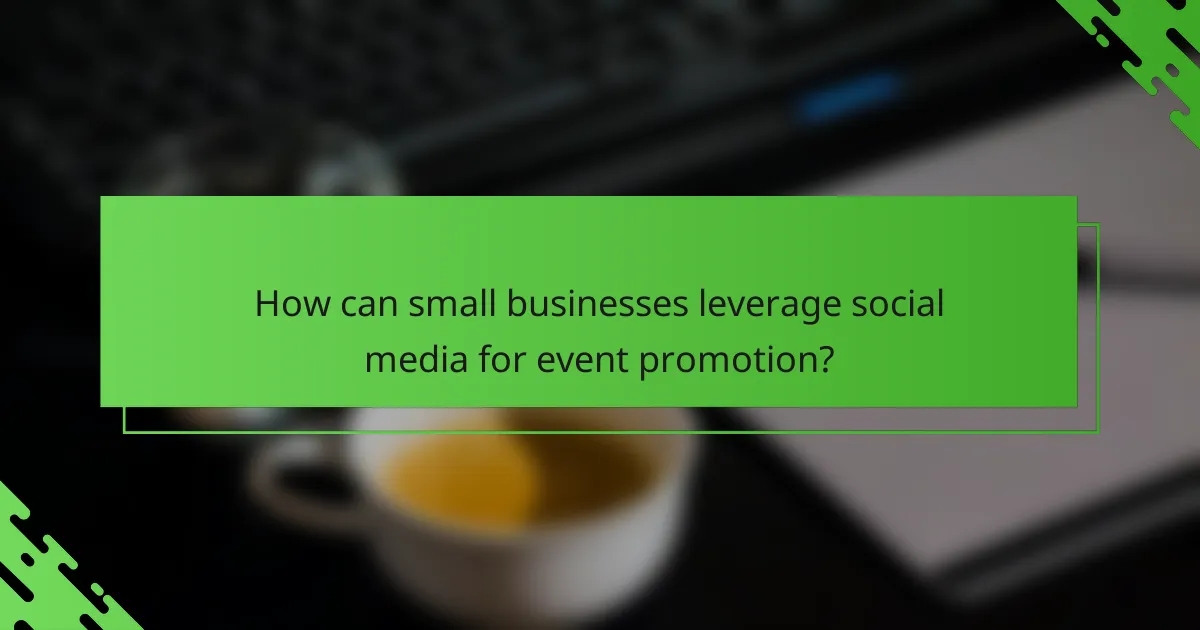
How can small businesses leverage social media for event promotion?
Small businesses can effectively use social media to promote events by reaching targeted audiences and engaging them through compelling content. By utilizing various features of social platforms, businesses can enhance visibility and drive attendance.
Utilize targeted ads
Targeted ads allow small businesses to reach specific demographics that are most likely to attend their events. Platforms like Facebook and Instagram offer robust targeting options based on interests, location, and behaviors, enabling businesses to maximize their advertising budget.
When creating targeted ads, consider setting a budget that aligns with your event’s scale. A range of $50 to $500 can be effective for local events, depending on your audience size and engagement goals.
Create engaging content
Engaging content is crucial for capturing attention on social media. Use eye-catching visuals, videos, and compelling captions to promote your event. Highlight key details such as the date, location, and unique features that set your event apart.
Consider using countdowns, polls, or interactive posts to encourage audience participation. Regularly updating your followers with fresh content can keep your event top-of-mind and increase anticipation.
Collaborate with influencers
Partnering with local influencers can amplify your event’s reach and credibility. Influencers often have established trust with their followers, making their endorsements valuable for attracting attendees.
When selecting influencers, look for those whose audience aligns with your target market. Offering them free tickets or exclusive access can incentivize them to promote your event authentically.

What are the costs associated with event promotion tools?
The costs of event promotion tools can vary widely based on features and usage. Small businesses should consider subscription fees, transaction fees, and additional service costs when budgeting for these tools.
Subscription fees
Subscription fees are often the primary cost associated with event promotion tools. These fees can range from a few dollars per month for basic features to several hundred dollars for advanced functionalities. It’s essential to evaluate what each tier offers to ensure it aligns with your business needs.
Many platforms offer tiered pricing models based on the number of events, attendees, or features included. For example, a small business might find a plan costing around $30 to $100 per month sufficient for their needs, while larger enterprises may require more comprehensive plans.
Transaction fees
Transaction fees are additional costs incurred when processing ticket sales or registrations through event promotion tools. These fees typically range from 2% to 5% of the ticket price, depending on the platform and payment processor used.
It’s crucial to factor in these fees when setting ticket prices, as they can significantly impact overall revenue. Some platforms may offer a flat fee per transaction, which can be more predictable for budgeting purposes.
Additional service costs
Additional service costs can include expenses for features such as email marketing, analytics, or customer support. These costs can vary widely, with some tools offering these services as part of their subscription, while others charge separately.
For instance, you might encounter costs for premium features like custom branding or advanced reporting tools, which can add $10 to $50 per month. Always review the full pricing structure to avoid unexpected expenses and ensure you are getting the best value for your investment.
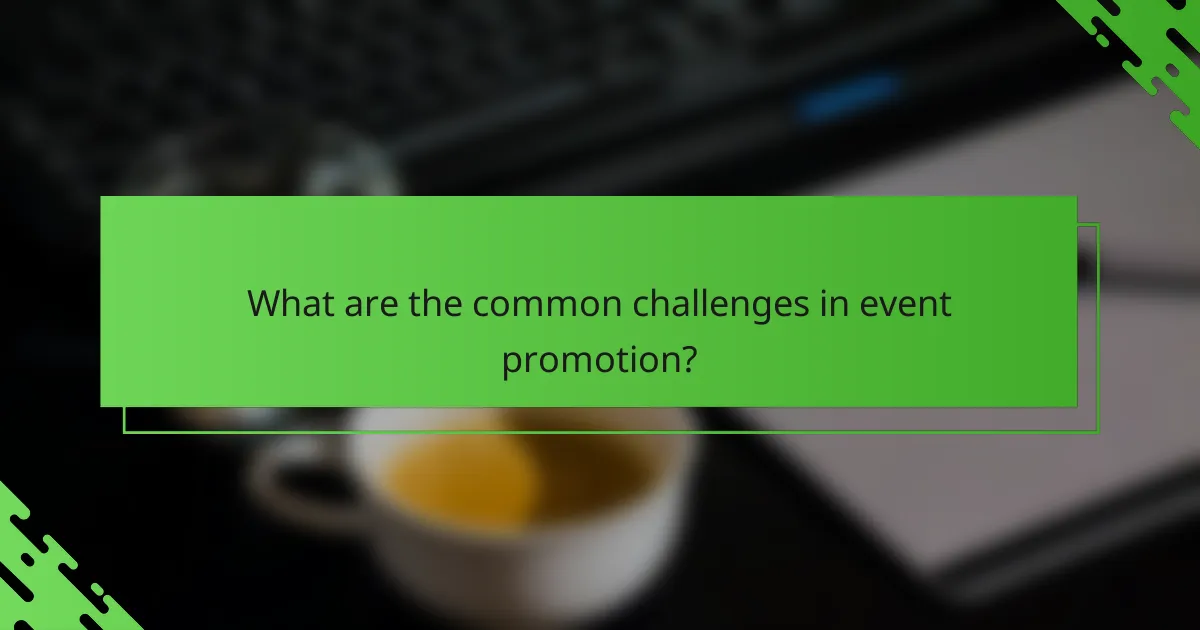
What are the common challenges in event promotion?
Small businesses often face several challenges in event promotion, including limited budgets, lack of resources, and difficulty in reaching target audiences. These obstacles can hinder their ability to effectively market events and achieve desired attendance levels.
Budget constraints
Budget constraints are a significant challenge for small businesses when promoting events. Limited financial resources can restrict advertising options, making it essential to prioritize cost-effective strategies. Utilizing social media platforms, email marketing, and community partnerships can help maximize reach without overspending.
Target audience engagement
Engaging the target audience is crucial for successful event promotion. Small businesses must identify their ideal attendees and tailor their messaging accordingly. Conducting surveys or using analytics tools can provide insights into audience preferences, helping to create more appealing promotional content.
Competition with larger organizations
Small businesses often compete with larger organizations that have more substantial marketing budgets and resources. To stand out, they should focus on unique selling points, such as personalized experiences or local connections. Highlighting these aspects in promotional materials can attract attendees who value community-oriented events.
Time management
Time management is another common challenge in event promotion. Small business owners often juggle multiple responsibilities, making it difficult to dedicate sufficient time to marketing efforts. Creating a detailed timeline with specific tasks and deadlines can help streamline the promotion process and ensure that all necessary steps are completed on time.
